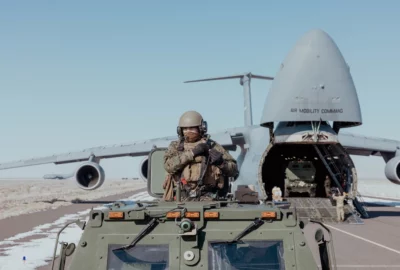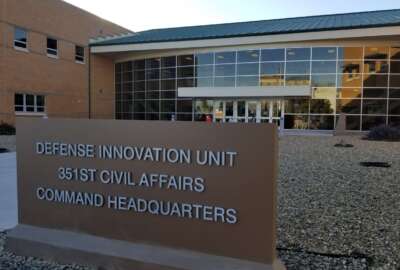DoD’s demand for trilingual leaders is ‘off the charts’
"It’s not time for a victory lap yet. [Maven Smart System] is a great example but we need a ton more examples of that to scale," Doug Beck said.
Demand for “trilingual” leaders — those who can navigate the acquisition and contracting systems as well as technical and operational domains — is now “off the charts,” according to the Defense Innovation Unit Director Doug Beck.
Trilingual leaders, a term now coined by Emelia Probasco, a senior fellow at Georgetown’s Center for Security and Emerging Technology, were crucial to the successful integration of the AI-powered Maven Smart system. Probasco, who looked into the story of how the Army’s 18th Airborne Corps used a series of Scarlet Dragon exercises to develop MSS said these trilingual leaders didn’t just have a great understanding of software and AI capabilities, they also “understood how to make the acquisition and contracting system work and they understood the boundaries and where they could maneuver.”
But trilingual leaders are still rare and not every command has access to such talent, although the Defense Innovation Unit helps to bridge that gap.
DIU’s recently released strategic vision, dubbed DIU 3.0, includes embedding its personnel directly into military commands and operations to help the organization better understand challenges that are unique to each command.
The unit has already placed technology leaders and experts directly into Indo-Pacific Command (INDOPACOM), European Command (EUCOM), Central Command (CENTCOM) and Special Operations Command. It has an AI/ML tech lead at INDOPACOM, for example, as the deputy director CTO for the Joint Mission Accelerator, and it has embeds at EUCOM headquarters and within the Security Assistance Group-Ukraine, who are helping to “operationalize things like the cross-domain movement of data.”
“This is all about solving those most critical operational capability gaps, which starts with having people who are trilingual effectively, they’re embedded with the team. And I don’t mean [liaison officer], because I’ve been an LNO and I’ve been an embed with my uniform on. I mean embedded in the team, part of the team,” Beck said.
“But I also think it’s not time for a victory lap yet. That 1.0 period of DIU really built the bridge using dual fluency capability. And at first, it was really just building a bridge and introducing people. But they very quickly married that up with a more trilingual capability to bring rapid acquisition, contracting ninjas who understood authorities we already had and put those in place so that we could put real points on the board, put prototypes in place, and do it quickly,” Beck added.
While the unit was able to quickly shift to this trilingual capability and accelerate the deployment of prototypes across the commands, Beck said the organization needs to partner with the rest of the DoD “in a completely different way.”
“That means partnering deeply with the services, and taking that contracting ninjutsu and applying it to more bureaucratic ninjutsu, and also deep trust-based partnerships with the services, with our partners across the rest of the office of the Secretary of Defense, with the Joint Staff, to be able to truly scale things,” Beck said.
The recently signed memorandum of understanding with the Chief Digital and Artificial Intelligence Office showcases the potential for this approach. The memo details how DIU will focus on bringing AI technologies and capabilities to the front lines and the CDAO will establish the standards and policies necessary to implement these technologies across the department.
“Our team, this is really about us as an organization becoming truly trilingual and taking what that third language means to the next level because that’s what we have to do. MSS is a great example, but it’s just getting started, and we need a ton more examples of that to scale,” Beck said.
Probasco argues in her report that not everybody needs to be a trilingual leader, but the DoD leadership should consider adjusting its promotion policies and personnel rules to recognize and support these trilingual leaders.
Copyright © 2024 Federal News Network. All rights reserved. This website is not intended for users located within the European Economic Area.







